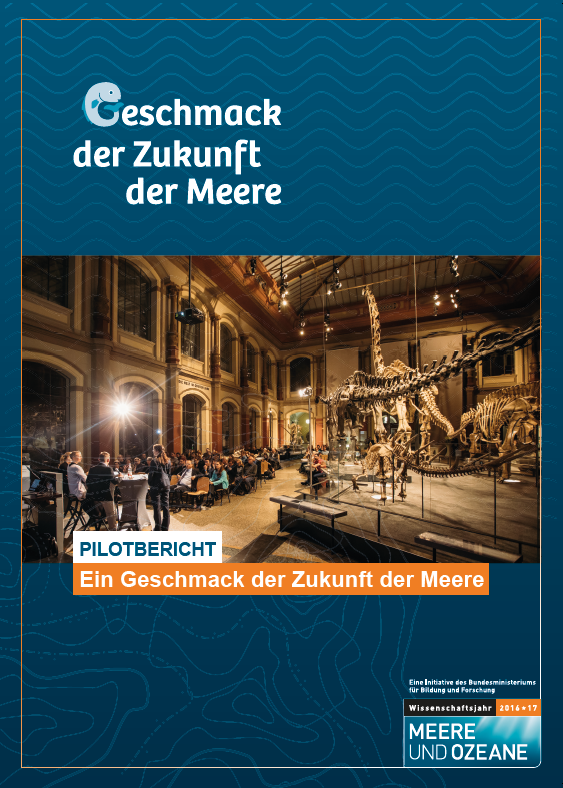Science Sips on Fisheries Policy in the Science Year 2016*17 – Seas and Oceans
- Event
- Date
-
- Location
- Berlin, Germany
In the fourth and final Science Sips event was dedicated to the topic of fisheries policy. Fish is a substantial source of food worldwide, but science and civil society warn that we may be overfishing the seas. The national and European fisheries policy framework seeks to ensure sustainable fishing and the protection of oceans – but does fisheries policy achieve this? How does fisheries policy affect the food on our plates? What can an individual consumer do in re-sponse to these policies and ocean conservation? The project "Taste of the Future of the Seas" is part of the Science Year 2016*17 – Seas and Oceans, funded by the German Federal Ministry for Education and Research, and addresses the challenges and opportunities for sustainable use of marine ecosystems.
Short input presentations were held by:
- Dr. Alexander Kempf, Section Leader Living Marine Resources, Thünen Institute of Sea Fisheries. Dr. Kempf explained how the common fisheries policy (CFP) of the European Union sets goals so that fisheries and aquaculture are environmentally sustainable as well as economically and social sustainable. Scientific advice provided by Dr. Kempf and others is intended to provide the basis for political decisions in the achievement of the sustainability objectives. The goal of the scientific work behind the CFP is to assess when a fish stock is overfished or outside of its biological limits, so that fishing quotas can be set appropriately. Within the CFP, achieving the so called Maximum Sustainable Yield (MSY) is the central management goal. While the CFP is a very good approach, more transparency in the allocation of quotas and improved controls provide a potential for improvement.
- Sebastian Wegner, Policy Coordinator, Fisheries Transparency Initiative at the Humboldt-Viadrina Governance Platform. His presentation emphasized the importance of transparency for sustainable fishing. Transparency is key for ensuring that sustainable management is actually being implemented, and for preventing illegal fishing. He presented the Fisheries Transparency Initiative (FiTI), which is a non-binding multi-actor initiative established to strengthen transparency and participation in sustainable fisheries. To this end, a so-called FiTI standard has been developed, which has twelve criteria that must be fulfilled by the member countries in order to obtain the "FiTI Compliant" label.
- Vivien Kudelka, Fisheries and Stakeholder Engagement Manager, Marine Stewardship Council (MSC). Mrs. Kudelka presented the MSC, a global non-profit organization established 20 years ago that has developed an environmental standard and label in accordance with internationally recognized best practices for sustainable fisheries. With the use of market-mechanisms, the MSC influences fishery practices and policies. She explained how the MSC integrates scientific data on fish stock sustaiability into their work with stakeholders from fisheries and policy. Certified fisheries are actively working to ensure that policy is actually implementing the quotas recommended by science, as this supports the success of their business.
The evening was moderated by Stephanie Wunder, Senior Fellow and coordinator of the food systems branch at Ecologic Institute. After the presentations, an active discussion followed with the audience. Speakers explained that some evidence exists that points to the effectiveness of certification schemes and the CFP approach to quotas for improving fishery stock health, but that much of it is anecdotal and data is missing to make solid conclusions. They also discussed how certification processes can provide platforms for improved trans-disciplinary dialogue between stakeholders and policy. Nevertheless, many of the world's fish stocks are still overfished. As an appeal to the audience the experts stated the power of consumers and that their choices can have an impact on overfishing.
After the discussion, participants enjoyed summer ratatouille made from organic vegetables and trimmings from codfish, delicious small cuts of fish which otherwise would have been discarded due to their low commercial value, provided by the culinary partners Küstlichkeiten and Bone.Berlin. Over refreshing seaweed cocktails, participants actively discussed the evening's topics with the three experts in an informal setting at "Ask a Scientist" tables.





